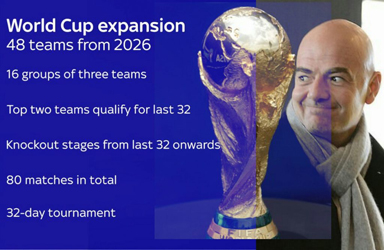With not a great deal of Arsenal news at present, what with the extended break due to the postponed away game v Southampton, I thought I’d have a look at FIFA’s announcement that beginning with the 2026 World Cup Finals, there will be 48 competing teams. The main reason for this seems to be not so much the ability to add a further 16 countries to the 32 in the existing format, but the estimated extra income it will generate for FIFA – reckoned to be £521 million extra.
Anyway, I actually don’t think it’s the worst idea FIFA have ever had. There will be an extra knockout round - so 32 sides qualify from the 16 groups and we will see an increase from the current tournament total of 16 knockout games to 32 of them. So the first round of matches after the group stage will be the equivalent of the FA Cup 4th Round. The group phase matches will effectively be jostling for position, with, I suspect, the majority of the teams going home early being those from outside the two traditional football powerbases of Europe and South America.
It’s certainly a bloated format, a long way from the last ‘pure’ finals of Mexico 70 with four groups of four producing eight quarter finalists. Then, there were 32 matches in total. Strange to think that in those days, when TV was not so influential, a lot more of the games actually kicked off at the same time, so it was not possible to watch as many (nor catch up with them later, these being the days before video recording). I am too young to remember, but my assumption is that if two games were being played concurrently, BBC would have showed one and ITV the other. Take your pick.
Since then we have had the introduction, and subsequent abandonment, of second round group stages, the re-introduction of knock out games before the final, staggered kick off times to ensure the maximum number of games can be watched live, and increases in the number of teams to 24, then 32. By France 98, the format was tidy once more. Eight groups of four produced 16 sides in the knockout rounds and with 64 matches in total, the tournament had doubled in size in 28 years.
So, another 28 years on, for 2026 we will have an extra 16 matches – 80 in total. However, the introduction of three team groups has a couple of interesting consequences. First up, sixteen of the competing nations will only play a maximum of two games instead of three. You’d have to go a long way back to find the last time that happened (I am guessing pre World War II). But more significantly, with only three matches per group, a potential situation arises for the final fixture. Let’s say we have a group with Germany, Colombia and Australia. So Germany beat Australia 1-0 in the opening match. Then Australia and Colombia draw. Germany have safely qualified irrespective of the result of their final group match against Colombia. They might then play a weakened side, allowing Colombia victory, or simply play safe and go for a draw that gives them first place in the group and allows Colombia to qualify ahead of Australia. In other words, by not having one of the teams involved in the final and decisive group match, all kinds of shenanigans are possible. If there are two 1-1 draws in the first two matches, the two sides playing the third game could conspire to play out a 2-2 draw to ensure they both go through on number of goals scored.
Then again, this is a FIFA tournament, an organization riddled with corruption. So that's the downside. The upside is that with more knockout games, there should, in theory, be greater excitement and certainly less room a bad performance. And with only two group matches for each country, there should be more drama there too. The stakes per game are certainly higher. One defeat could prove terminal. An extra sixteen matches in the same number of days (32) also means couch potato loving football fans can overdose even more than they currently do.
There is a downside. There is little tension in the qualifying stages these days, given the number of places available. After the 2022 finals, there will be even less with the expansion of the tournament. But let’s face it. No-one gives a stuff about international football until the major finals come round every other summer. So that doesn’t really change anything. I have minimal interest in watching England (or pretty much any international) matches until they are in the World Cup Finals or the European Championship Finals.
Anyhow, once the World Cup Finals come round and I get into the tournament, then it’s all good as far as this particular couch potato is concerned. Bring on 2026.










